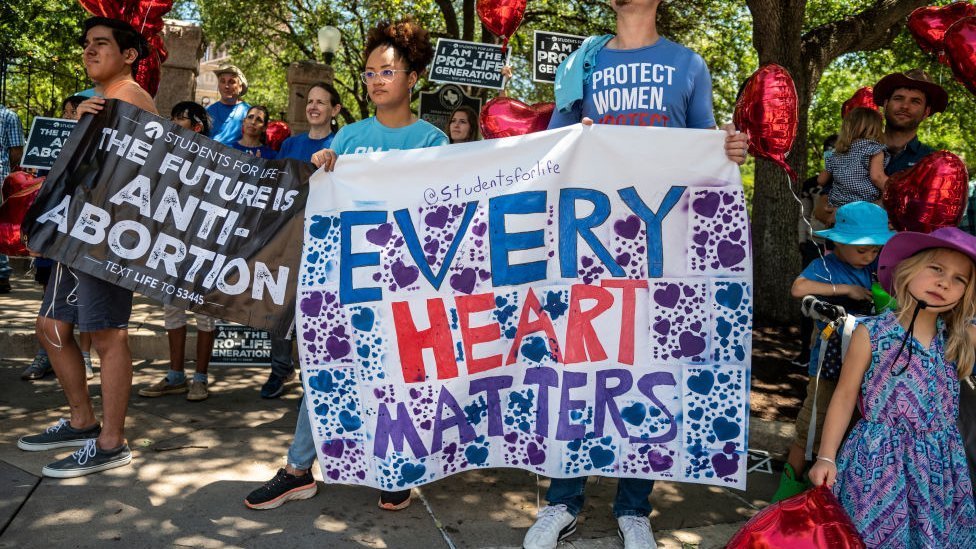US President Joe Biden has condemned a new law in Texas banning abortion from as early as six weeks and vowed to defend women’s constitutional rights.
The “extreme” law “blatantly” violated rights and would “significantly impair” women’s access to healthcare, he said.
On Wednesday the Supreme Court refused, by a 5-4 vote, to block the new law.
The law bans abortions after detection of what anti-abortion campaigners call a foetal heartbeat – a point when many women do not know they are pregnant.
The so-called Heartbeat Act also gives any individual the right to sue doctors who perform an abortion past the six-week point.
Doctors and women’s rights groups have heavily criticised the law, which is one of the most restrictive in the country, and took effect after the conservative-leaning Supreme Court failed to respond to an emergency appeal.
Abortion and women’s health providers had filed an emergency request to the Supreme Court calling for an injunction on enforcement of the ban.
However, the court refused.
In an unsigned explanation the court’s majority said their decision was “not based on any conclusion about the constitutionality of Texas’s law”, and said legal challenges could proceed.
In a dissenting opinion, liberal Justice Sonia Sotomayor wrote that the court’s order was “stunning”.
“Presented with an application to enjoin a flagrantly unconstitutional law engineered to prohibit women from exercising their constitutional rights and evade judicial scrutiny, a majority of justices have opted to bury their heads in the sand,” she said.
In his statement, President Biden said his administration would “protect and defend” the constitutional rights established under Roe v Wade and “upheld as a precedent for nearly half a century”.
He was referring to the 1973 case in which the Supreme Court ruled US women have the right to an abortion until a foetus is viable – that is, able to survive outside the womb. This is usually between 22 and 24 weeks into a pregnancy.
White House spokeswoman Jen Psaki told reporters that the president had long wanted to see the “codification” of Roe v Wade – which would mean Congress voting to make the precedent federal law – “and [the Texas law] highlights even further the need to move forward on that effort”.
Other Democrats also expressed their outrage.
House Speaker Nancy Pelosi said the Supreme Court had “delivered catastrophe to women in Texas” while New York Mayor Bill de Blasio said it was a “direct assault on the rights of women” across the country and would need a “national mobilisation” to fight it.
Rights groups, including Planned Parenthood and the American Civil Liberties Union (ACLU) who had requested that the Supreme Court block the legislation, say they will not give up the fight.
How does this law differ from other restrictions?
Most abortion restrictions that have been proposed before have relied on criminal penalties or some form of regulatory punishment.
The Texas law, which was signed into law by Governor Greg Abbott in May, instead authorises “a private civil right of action”, which allows people to sue to enforce the law even if they themselves have not been harmed.
An ordinary American, from Texas or elsewhere, may now be able to seek up to $10,000 (£7,200) in damages in a civil court against abortion providers and doctors – and possibly anyone at all involved in the process.
That means people like clinic staff, family members, or clergy who encourage or support the procedure could, in theory, be sued.
The legislation makes an exception in the case of medical emergency, which requires written proof from a doctor, but not for pregnancies resulting from rape or incest.
Turning over enforcement of the Heartbeat Act to private citizens instead of government officials likely means that – in the absence of Supreme Court intervention – the law cannot be challenged until a private citizen seeks damages.
Kim Schwartz of the Texas Right to Life organisation, which supports the measure, told the BBC most anti-abortion laws were “held up in the court system for years” and this “thwarts the will of the people”.
She argued that courts would require “a credible claim that an illegal abortion occurred” and would still undergo fact-finding processes.
But the ACLU and other critics have suggested the Texas law will champion “a bounty hunting scheme” of costly “vigilante lawsuits” designed to harass women seeking an abortion.
The ACLU noted tip lines have already been set up by anti-abortion groups.
Source: BBC














